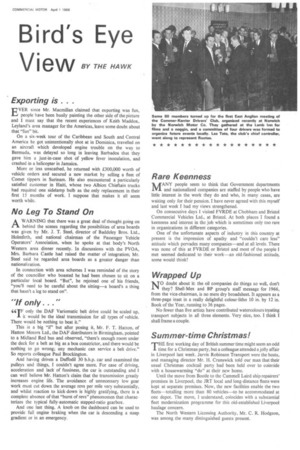Bird's Eye
Page 47

If you've noticed an error in this article please click here to report it so we can fix it.
ViewBY THE HAWK
Exporting is.
EVER since Mr. Macmillan claimed that exporting was fun, people have been busily painting the other side of the picture and I must say that the recent experiences of Keith Maddox, Leyland's area manager for the Americas, leave some doubt about that "fun" bit.
On a six-week tour of the Caribbean and South and Central America he got unintentionally shot at in Dominica, travelled on an aircraft which developed engine trouble on the way to Bermuda, was delayed so long in leaving Barbados that they gave him a just-in-case shot of yellow fever inoculation, and crashed in a helicopter in Jamaica.
More or less unscathed, he returned with £300,000 worth of vehicle orders and secured a new market by selling a fleet of Comet tippers in Surinam. He also encountered a particularly satisfied customer in Haiti, whose two Albion Chieftain trucks had required one sidelamp bulb as the only replacement in their first 15 months of work. I suppose that makes it all seem worth while.
No Leg To Stand On
AWARNING that there was a great deal of thought going on behind the scenes regarding the possibilities of area boards was given by Mr. J. T. Steel, director of Baddcley Bros. Ltd., Hohnfirth, and national chairman of the Passenger Vehicle Operators' Association, when he spoke at that body's North Western area dinner recently. In discussions with the PVOA, Mrs. Barbara Castle had raised the matter of integration; Mr. Steel said he regarded area boards as a greater danger than nationalization.
In connection with area schemes I was reminded of the story of the councillor who boasted he had been chosen to sit on a particular local board. "But", he rejoined one of his friends, "you'll need to be careful about the sitting—a board's a thing that hasn't a leg to stand on".
"If only. .. /0 44-1F only the DAF Variomatic belt drive could be scaled up, it would be the ideal transmission for all types of vehicle. There would be nothing to beat it."
This is a big "if' but after posing it, Mr. F. T. Hatton, of Hatton Motors Ltd., the DAF distributors in Birmingham, pointed to a Midland Red bus and observed, "there's enough room under the deck for a belt as big as a boa constrictor, and there would be nothing to go wrong; any mechanic can service a belt drive." So reports colleague Paul Brockington.
And having driven a Daffodil 30 b.h.p. car and examined the pulleys and things, I couldn't agree more. For ease of driving, acceleration and lack of fussiness, the car is outstanding and I can well believe Mr. Hatton's claim that the transmission greatly increases engine life. The avoidance of unnecessary low gear work must cut down the average revs per mile very substantially, and whilst reaction to kick-down is highly gratifying, there is a complete absence of that "burst of revs" phenonomen that characterizes the typical fully-automatic stepped-ratio gearbox.
And one last thing. A knob on the dashboard can be used to provide full engine braking when the car is descending a steep gradient or in an emergency.
Rare Keenness
MANY people seem to think that Government departments and nationalized companies are staffed by people who have little interest in the work they do and who, in many cases, are waiting only for their pension. I have never agreed with this myself and last week I had my views strengthened.
On consecutive days I visited FVRDE at Chobham and Bristol Commercial Vehicles Ltd., at Bristol. At both places I found a keenness and interest in the job which is sometimes only too rare in organizations in different categories.
One of the unfortunate aspects of industry in this country at present is the impression of apathy and "couldn't care less" attitude which pervades many companies—and at all levels. There was none of this at FVRDE or Bristol and most of the people I met seemed dedicated to their work—an old-fashioned attitude, some would think!
Wrapped Up
NO doubt about it: the oil companies do things so well, don't they? Shell-Mex and BP group's staff message for 1966, from the vice-chairman, is no mere dry broadsheet. It appears as a three-page inset in a really delightful colour-litho 10 in. by 12 in. Book of the Year, running to 36 pages.
No fewer than five artists have contributed watercolours treating transport subjects in all three elements. Very nice, too. I think I shall frame a couple.
Summer-time Christmas!
Fr HE first working day of British summer time might seem an odd time for a Christmas party, but a colleague attended a jolly affair in Liverpool last week. Jarvis Robinson Transport were the hosts, and managing director Mr. H. Cranswick told our man that their usual Christmas cocktail party had been held over to coincide with a housewarming "do" at their new home.
Until the move from Bootle to the Cammell Laird ship repairers' premises in Liverpool, the JRT local and long-distance fleets were kept at separate premises. Now, the new facilities enable the two fleets—totalling more than 80 vehicles—to he accommodated at one depot. The move, I understand, coincides with a substantial fleet modernization programme for this old-established Liverpool haulage concern.
The North Western Licensing Authority, Mr. C. R. Hodgson, was among the many distinguished guests present.




















































































































